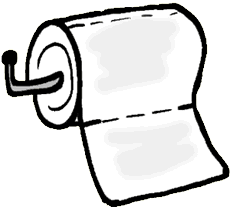
The intel had been in-coming for days. “There’s only one roll of toilet paper left in the house," the chatter kept saying. "You’d better get more or we’re going to run out.”
Looking back, I should have listened to my agents. I should have taken pre-emptive action.
But you’re never sure with the chatter. There’s so much of it out there, and it’s coming in all the time. “We’re out of granola bars. We’re out of outboard-motor pleasure boats. We’re out of two-seater Porsche Boxters.” (Actually, we were never really “in” pleasure boats and Porsches.)
Most of the time you can’t distinguish the good chatter from the bad.
So, I let things go. I ignored all the warnings because there were other priorities that seemed more important; more important, that is, until the morning I woke up early and discovered there were only four squares of toilet paper left in the house.
The chatter was correct. We were now under an imminent attack of no toilet paper. I should have listened.
The first thing I did was declare a Code Orange and impose rations. There were four full bladders in the house and there were four squares of toilet paper. You do the math.
Next, I called an emergency session with my second in command who can’t be named. We met in the situation room.
“This is not our finest hour,” I growled in my best Winston Churchill BBC radio voice. (Actually, before seven in the morning, I look a bit like Winston Churchill.) “Never has so much toilet paper been owed to so many by so few.”
I was just getting into the rhythms of my moral-building speech when my second in command interrupted with some down-to-earth tactical issues. “We have to establish a reliable supply and then plan a route,” he said. “And we have to do this now. Our men are depending on us.”
My second in command is always so practical in a crisis.
“Land, air or water?” I asked, feeling the panic mounting in my own bladder.
He scratched his head. “Well, if it’s speed we’re after, we should try air. We can use that old DC 9 you stored away in garage just in case we ever had need for it. Surely we need it now.”
“But that thing hasn’t been used in years,” I said. “It could be dangerous.”
“Madam,” he said sternly. “When the men wake up, they’ll be desperate to go to the bathroom. We have exactly four squares of toilet paper left in the house. With all due respect, this situation developed because someone didn’t listen to the chatter and failed to restock supplies.”
He was right. I’d failed my men. I hung my head in shame.
“But you’re right about the DC 9,” continued my second in command. I perked up. “The DC 9 is risky. I suppose we could go overland. Yes, we can saddle up the mules and take the Himalayan route. It won’t be easy, but it’s our best chance. I’ll make the journey.”
“No,” I said, stopping him in his tracks. “I’m the one who put the men and the men’s bladders in danger. This is my journey to make. You stay and feed the men their Cheerios when they wake up.”
And so I saddled up the mules and made the overland journey through the mountain pass to my supply base at the grocery store. We were in luck that morning: supplies were in, routes were clear and the weather was fine.
When I returned to base with the jumbo pack of triple-ply, the men were there to meet me, waving their hands and smiling. Their bladders were saved. Hooray! All of our bladders were saved. Hooray! I was the hero. Long live triple ply.
